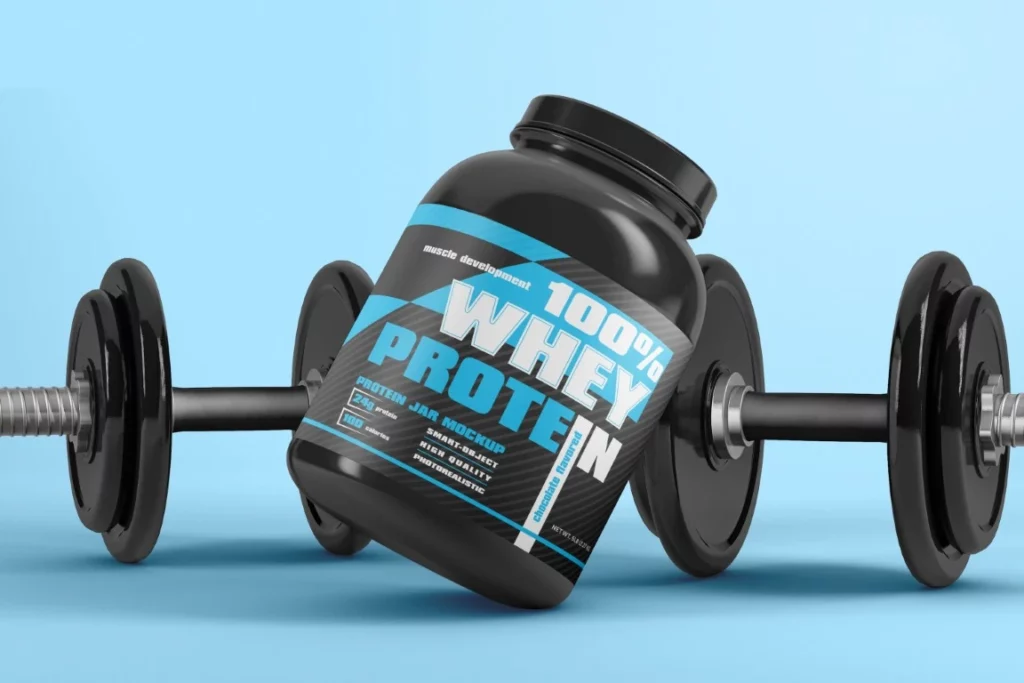Whey protein is a complete protein source that contains all nine essential amino acids that our bodies need but cannot produce on their own.
In this blog, we will explore the different types of whey protein, its benefits, and how it can help with muscle building and weight loss. We will also provide tips on how to choose the right whey protein supplement, as well as delicious recipes and other sources of lean protein to incorporate into your diet. But before we get started, let’s address some common questions about whey protein safety and potential side effects.
What is whey protein?
Whey protein is a protein obtained from milk, which has all the necessary amino acids for muscle growth and repair. It’s easily digestible and rapidly absorbed by the body, and can be consumed in various forms such as shakes, powder, bars or even added to meals.
Types of whey protein
There are three main types of whey protein:
- Whey protein concentrate (WPC),
- Whey protein isolate (WPI)
- Whey protein hydrolysate (WPH).
Whey protein concentrate is the most common type of whey protein. It is made by removing some of the lactose and fat from whey, but it still contains some of these nutrients. WPC is a good choice for people who are looking for a protein powder that is affordable and has a good taste.
Whey protein isolate is made by removing even more lactose and fat from whey than WPC. This results in a protein powder that is very high in protein and low in lactose and fat. WPI is a good choice for people who are lactose intolerant or who are trying to lose weight.
Whey protein hydrolysate is made by breaking down whey protein into smaller peptides. This makes it easier for the body to absorb and digest. WPH is a good choice for people who have digestive problems or who are looking for a protein powder that is absorbed quickly.
Here is a table that summarizes the key differences between the three types of whey protein:
- Whey protein concentrate 70-80% Protein content
- Whey protein isolate 90-95% Protein content
- Whey protein hydrolysate 90-95% Protein content
Ultimately, the best type of whey protein for you will depend on your individual needs and preferences. If you are unsure which type of whey protein is right for you, talk to your doctor or a registered dietitian.

Whey protein benefits
- Muscle building with whey protein
Whey protein supplements are a popular choice among athletes and fitness enthusiasts due to their health benefits such as reducing blood pressure and improving immune function. It contains all essential amino acids necessary for muscle building blocks of our body. One scoop of whey protein powder contains approximately 25 grams of high-quality protein supplement that can help achieve daily recommended intake if difficult from diet alone.
- Weight loss with whey protein
Consuming whey protein before or after exercise can aid in muscle recovery and growth, leading to an increased calorie burn. Studies have shown that resistance training and consuming enough protein are significant factors associated with better body composition change during weight loss programs. Whey protein contains all essential amino acids that act as building blocks for muscle growth and repair, making it an ideal supplement for those engaged in strength or resistance training regimens.
- Whey protein and appetite control
Consuming enough protein is essential for maintaining muscle mass and aiding in weight loss. Whey protein is a great supplement for achieving these goals due to its high-quality nutrition. It contains all the essential amino acids required by the body and has a thermogenic effect that increases metabolism, helping with fat loss. In addition, whey protein can help increase satiety and reduce hunger, leading to better appetite control. By preserving muscle mass while losing body fat, it also boosts metabolism and can aid in muscle recovery and growth, leading to increased calorie burn.
How to choose a whey protein supplement?
Here are some tips on how to choose a whey protein supplement:
- Consider your goals. What are you hoping to achieve by taking a whey protein supplement? If you’re looking to build muscle, you’ll need a protein powder with a high biological value (BV). BV measures how well the body can absorb and utilize a protein. Whey protein has a high BV, making it a good choice for muscle building. If you’re looking to lose weight, you’ll want a protein powder that is low in calories and fat.
- Look at the ingredients. Read the label carefully and make sure the protein powder is made with high-quality ingredients. Avoid protein powders that contain artificial sweeteners, colors, or flavors.
- Taste. This is important! You’re more likely to stick with a protein powder that you enjoy the taste of. Try a few different flavors before you decide which one you like best.
- Price. Protein powders can range in price from a few dollars to over $100 per container. It’s important to find a protein powder that fits your budget.

Whey protein isolate vs concentrate
When choosing between whey protein isolate and whey protein concentrate supplements, it is important to understand their differences. Whey protein isolate contains high amounts of essential amino acids per serving compared to whey protein concentrate. It also has lesser lactose and fat content, which makes it an ideal choice for people with lactose intolerance or those who are conscious about their fat intake.
Alternatively, if you’re looking for a more affordable option that also has growth factors and immune-enhancing peptides, then you might want to consider using whey protein concentrate supplements instead.
Both types of supplements have been shown to support muscle building and recovery when used as part of a balanced diet and exercise program. So depending on your individual goals and preferences, either option could be a great fit.
How much whey protein per day for weight loss?
The amount of whey protein you need per day for weight loss depends on a number of factors, including your age, sex, activity level, and current body weight. A general guideline is to consume 0.7-1 gram of protein per pound of body weight. So, if you weigh 150 pounds, you would need to consume 105-150 grams of protein per day.
Whey protein can be a helpful addition to a weight loss diet because it can help you feel fuller longer, which can help you eat fewer calories overall. Whey protein can also help to build and repair muscle tissue, which can help to increase your metabolism and burn more calories.
If you are new to using whey protein, it is a good idea to start with 1-2 scoops per day and gradually increase the amount as needed. You can also talk to your doctor or a registered dietitian to get personalized advice on how much whey protein is right for you.
Here are some tips for using whey protein for weight loss:
- Drink a whey protein shake after your workouts. This will help your muscles recover and rebuild, which can help to boost your metabolism.
- Add whey protein to your meals and snacks. This is a great way to increase your protein intake without adding extra calories.
- Choose a whey protein powder that is low in calories and fat.
- Avoid adding sugary drinks to your whey protein shakes.
- If you are taking whey protein for weight loss, it is important to also follow a healthy diet and exercise regularly. These are the most important factors for losing weight and keeping it off.
Let’s Sum Up
Whey protein powder is a healthy and easy way to supplement your diet with extra protein, whether you are looking to build muscle or lose weight. Its diverse benefits go beyond just muscle building and can aid in appetite control as well. With so many options available in the market, it’s important to choose the right whey protein supplement for your needs. Our blog covers everything from recipes to daily protein requirements to potential side effects. So why wait? Get all your questions answered and start reaping the benefits of whey protein powder today!
You May Also Like
- Cross-Training for Fitness and Endurance: How to Mix Up Your Workouts
- Bodyweight Training: A Beginner’s Guide to Working Out at Home
- Strongman Training: How to Develop Incredible Strength and Power for Competition and Everyday Life
- Powerlifting: Tips and Tricks for Building Strength and Dominating the Competition



